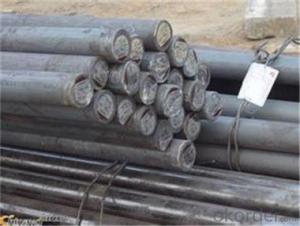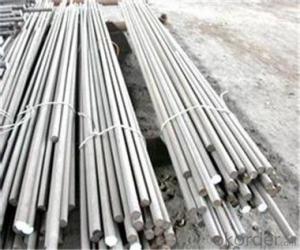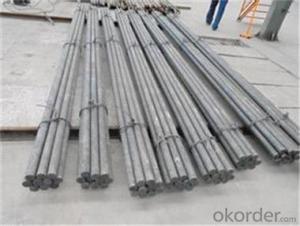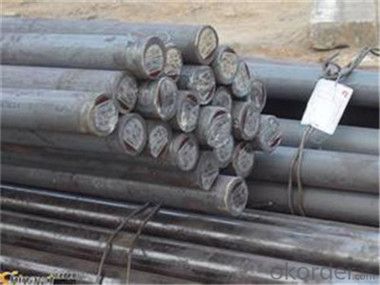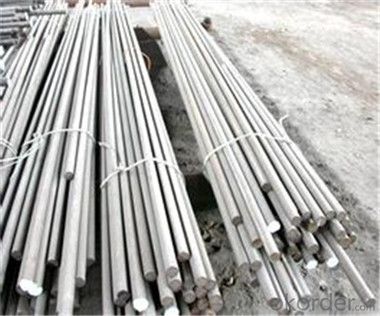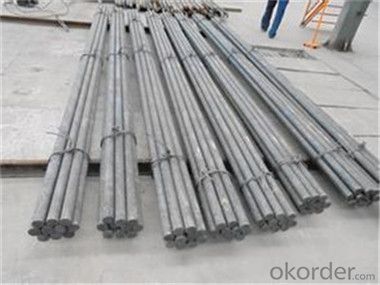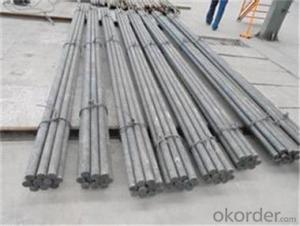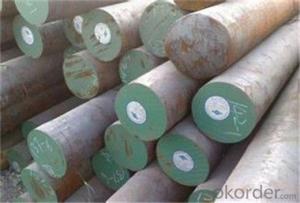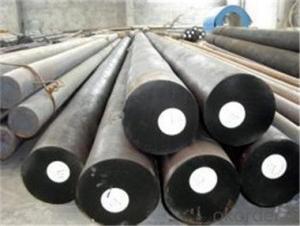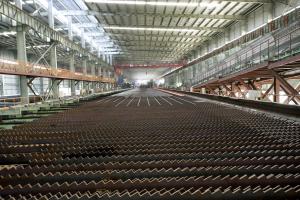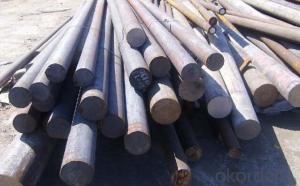Hot Rolled Carbon Steel Round Bar MS Bar -China
- Loading Port:
- Tianjin
- Payment Terms:
- TT OR LC
- Min Order Qty:
- 88 m.t.
- Supply Capability:
- 2000000 m.t./month
OKorder Service Pledge
OKorder Financial Service
You Might Also Like
Description of steel round bar:
1. Commodity: Round steel bar
3. Technical: Hot rolling
2. Length: Min. 5.8meter, according to requirement.
3. Diameter: 16mm-250mm
5. Packing: In Bundle or according to your requirements.
Festures of steel round bar:
Description : Steel Bar/Stainless Steel Round Bar/Alloy Steel Round Bar/Carbon Steel Bar
Stainless Steel Bright Bar/Stainless Steel Peeled Bar/Stainless Steel Polishing Bar
Diamater:
1 Hot rolled round bar diameter from 5.5mm to 110mm
2.Hot forged round bar diameter from 110mm to 400mm
3.Cold drawn round bar diameter from 2.0mm to 60mm
4.Grinding bar diameter from 4.0mm to 40mm
5.Turn smooth diameter from 40mm to 250mm
Specifications of steel round bar:
Length: standard 6m,9m,12m, or as customers' requirement
Surface: Black, polished, grinded, ,Bright, Turn smooth(Peeled),Brush,Mill,Pickled
Process:Hot rolled,cold drawn,forged
Packing: In bundle, tied by steel straps, covered with protecting film Use wooden box, fill with foam to keep the surface from damaging
Images of steel round bar:
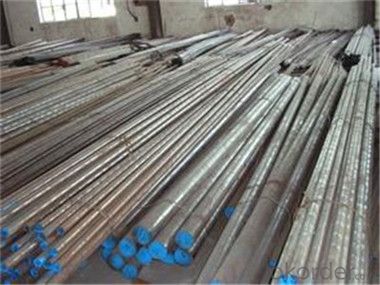
FAQ:
1. How long is the lead time?
Delivery time: 45 days after order confirmed.
2. What payment term do you accept?
Payment: T/T or L/C at sight.
3.Why do you choose to cooperate with us?
We have over10 years experience in this business so we are able to provide you the high quality products with the best price.
- Q: Can steel round bars be used for making stabilizer bars?
- Yes, steel round bars can be used for making stabilizer bars. Steel round bars are commonly used in various industries, including automotive, for their high strength and durability. Stabilizer bars require materials that can withstand heavy loads and provide stability, making steel round bars an ideal choice for their construction.
- Q: How do you calculate the weight of a steel round bar?
- To determine the weight of a steel round bar, one can utilize the following equation: Weight = (Diameter^2 / 4) * Length * Density Within this equation, the Diameter signifies the round bar's diameter, Length denotes the bar's length, and Density represents the steel material's density. Initially, it is imperative to precisely measure the steel round bar's diameter. Subsequently, square the diameter by multiplying it by itself. Proceed to divide the outcome by 4. This shall yield the cross-sectional area of the round bar. Following this, multiply the cross-sectional area by the length of the bar. Lastly, multiply this value by the density of the steel material. Typically, the density of steel is around 7850 kg/m^3. The outcome of this computation shall furnish the weight of the steel round bar in either grams or kilograms, contingent upon the units implemented for the length and density.
- Q: What is the difference between the heat treatment of cold drawn round steel and the heat treatment of wrought round steel?
- Solution heat treatment: the alloy is heated to a single phase at high temperature to maintain constant temperature, so that the excess phase is fully dissolved in the solid solution, and then cooled rapidly to obtain the heat treatment process of supersaturated solid solution.
- Q: How are steel round bars used in the construction of dams and reservoirs?
- Due to their strength, durability, and versatility, steel round bars are essential components in the construction of dams and reservoirs. These bars, typically made of reinforced steel, play a vital role in reinforcing the concrete structures that make up dams and reservoirs. In dam construction, steel round bars are primarily used as reinforcement in concrete walls and foundations. Strategically placed within the concrete, these bars provide additional tensile strength, preventing cracking and ensuring the structural integrity of the dam. By withstanding the enormous pressure exerted by the water, the reinforcement helps prevent leaks or potential failures. Furthermore, steel round bars are utilized to strengthen the spillway gates and control structures of dams and reservoirs. These gates regulate the flow of water and prevent overflow during heavy rains or floods. By reinforcing these critical areas with steel round bars, engineers guarantee that the gates can endure the forces exerted by the flowing water, maintaining their functionality and preventing potential damage. In addition, steel round bars are used in the construction of penstocks, which are large pipes or conduits that transport water from reservoirs to turbines in hydroelectric power plants. These bars reinforce the penstocks, ensuring they can withstand the high pressure of the water as it flows through and powers the turbines. In conclusion, steel round bars are extensively applied in dam and reservoir construction to enhance the strength and durability of various structural components. Their ability to reinforce concrete walls, foundations, spillway gates, control structures, and penstocks makes them indispensable in ensuring the longevity and stability of these crucial water infrastructures.
- Q: What is the minimum yield strength of steel round bars?
- The minimum yield strength of steel round bars can vary depending on the specific grade and type of steel being used. However, most commonly used carbon steels have a minimum yield strength of around 36,000 to 50,000 pounds per square inch (psi).
- Q: Do steel round bars have a maximum load capacity?
- Yes, steel round bars have a maximum load capacity. The maximum load capacity of a steel round bar is determined by various factors such as the diameter and length of the bar, the type and grade of steel used, and the specific application or industry standards it is being used in. The load capacity is usually determined through testing and analysis, taking into consideration factors like yield strength, ultimate tensile strength, and the ability of the bar to withstand bending or deformation under load. It is important to consult engineering specifications and guidelines to ensure that the maximum load capacity of a steel round bar is not exceeded in order to maintain safety and structural integrity.
- Q: Requirements for groove welding of grade 22mm round steel and manual arc welding
- If not on the lathe, in the groove on the round bar with gouging or cutting gun, docking form X type double sided bilateral docking, blunt edge 2mm root gap 2mm welding, welding side sincere one or two seam, flip the workpiece on the other side of a full weld groove, flip weld residual,
- Q: What are the different types of steel round bars used in the automotive braking systems?
- There are primarily two types of steel round bars used in automotive braking systems: solid steel round bars and hollow steel round bars. Solid steel round bars are commonly used for brake rotors and brake drums, providing strength and durability to handle the heat and friction generated during braking. Hollow steel round bars, on the other hand, are often utilized for brake caliper pistons, as they offer a lighter weight option without compromising on strength and performance.
- Q: Can steel round bars be used for making cutlery or kitchen utensils?
- No, steel round bars are not typically used for making cutlery or kitchen utensils. These items are usually made from stainless steel or other food-safe materials that are specifically designed for food contact and are more suitable for the purpose.
- Q: How do you check the quality of a steel round bar?
- To check the quality of a steel round bar, several methods can be employed. Firstly, visual inspection is crucial, where one should look for any surface defects, such as cracks, pits, or unevenness. Next, measurements of diameter, length, and straightness should be taken using appropriate tools. Additionally, conducting a hardness test using a hardness tester can determine the bar's hardness, ensuring it meets the required specifications. Other quality checks may involve verifying the chemical composition and performing non-destructive tests like ultrasonic or magnetic particle inspections to identify any internal flaws. Ultimately, a comprehensive assessment combining these various methods will help ascertain the overall quality of the steel round bar.
Send your message to us
Hot Rolled Carbon Steel Round Bar MS Bar -China
- Loading Port:
- Tianjin
- Payment Terms:
- TT OR LC
- Min Order Qty:
- 88 m.t.
- Supply Capability:
- 2000000 m.t./month
OKorder Service Pledge
OKorder Financial Service
Similar products
Hot products
Hot Searches
Related keywords
